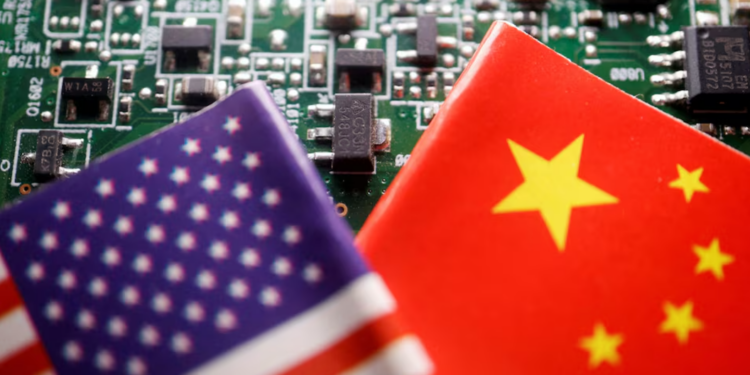Four of China’s major industry associations have issued a strong warning to local companies, advising them against purchasing U.S.-made semiconductor chips.
The associations, which represent key sectors such as telecommunications, the digital economy, automotive, and semiconductors, cautioned that these chips are now considered “no longer safe” for use by Chinese firms.
The groups representing over 6,400 companies across multiple industries—released similarly worded statements expressing concerns over the safety and reliability of U.S. semiconductor products.
According to a report by Reuters, they did not provide specific details on why the chips were considered unsafe, the statements reflect growing unease over the ongoing trade tensions between the U.S. and China.
The Internet Society of China, one of the organizations involved, has urged domestic companies to reconsider procuring U.S. chips and to expand cooperation with chip manufacturers from other countries and regions.
The society further emphasized that local firms should “proactively” seek chips produced by both domestic and foreign-owned companies based in China.
“We must carefully evaluate the risks of relying on foreign chips, the U.S. export controls have caused substantial harm to the development of China’s internet industry,” the Internet Society of China stated on its official WeChat account.
U.S. chipmakers face potential losses
- The shift in strategy could lead to a reduction in sales for U.S. chipmakers in China, a key revenue source for companies like Nvidia, AMD, and Intel.
- These companies have managed to maintain some access to the Chinese market despite facing export controls, but the latest development may signal further challenges.
- China’s move to develop its own semiconductor supply chain could be an attempt to reduce dependence on foreign suppliers, particularly amid heightened tensions with the U.S.
Escalating trade tensions
- This coordinated warning comes as trade relations between the U.S. and China continue to deteriorate, particularly in the technology and semiconductor sectors.
- The United States has launched its third major crackdown on China’s semiconductor industry, imposing export restrictions on 140 companies, including Naura Technology Group.
- The measures target advanced-node chipmaking equipment, software tools, and high-bandwidth memory critical for AI applications. Companies like Lam Research, KLA Corp, Siemens (parent of Mentor Graphics), and South Korea’s Samsung, which relies on China for 20% of its HBM chip sales, are directly affected.
- In response, China has banned exports of gallium, germanium, and antimony to the United States, citing national security concerns.
- These minerals, which have both military and civilian applications, are critical to semiconductor and defense industries. The directive, effective immediately, also imposes stricter reviews on the export of graphite items to the U.S.
“The export of gallium, germanium, antimony, and superhard materials to the United States shall not be permitted,” China’s commerce ministry stated.
This retaliation underscores the escalating trade and technological tensions between the two countries, with both sides targeting industries critical to future technologies.
The new restrictions are expected to further disrupt global supply chains, forcing companies to adapt to rapidly shifting regulations.


















